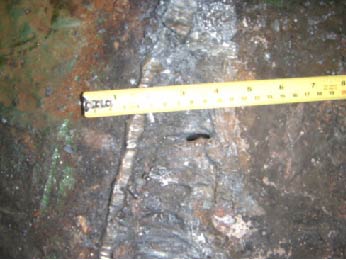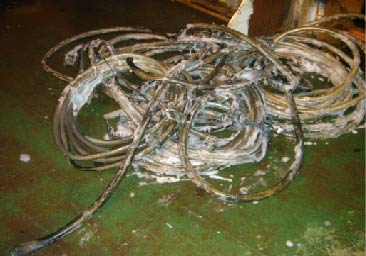Hole burnt in vessel deck during removal of sea-fastenings
A member has reported an incident in which two holes were burnt in the deck of a vessel by a third party contractor during hot work. At the time of the incident the vessel was in port carrying out a number of activities including the burning off of a large quantity of deck sea fastenings. A specialist sub-contractor known to have experience in the removal of sea fastenings had been engaged to carry out this work.
The sub-contractor was briefed and familiarised with the work site in accordance with company procedures and the workers were all fully aware of the requirement to burn off the sea fastening cleats at greater than 3mm above deck level. All appropriate hot work permits and relevant precautions were in place including a fire watch.
The sub-contractor’s team commenced removal of the sea fastenings in various locations around the deck and during the course of a day successfully removed a large quantity of sea fastenings without incident.
Work on the after deck included the removal of a number of sea fastening cleats from around a reel cradle, in preparation for the lifting of the reel from the deck. Whilst removing the last of these cleats one of the contractors burnt two holes in the deck at either end of the cleat. Molten metal fell through the holes in the deck and ignited a coil of plastic hose stored in the space immediately below which began to smoulder and give off a quantity of black smoke. The fire watch immediately noticed smoke from that area and using radio, informed the individual carrying out the burning to stop work immediately. The fire alarm was then raised.
No injuries were caused as a result of the incident. However, any damage to a vessel deck is potentially very serious and the incident could have had the potential for more serious consequences.


Investigation and Lessons Learnt
The vessel fire and emergency procedures worked well and the incident was quickly and professionally contained within a few minutes. Upon investigation, it appears that the plastic hose may have been on fire due to damage it had sustained, but there was no damage to any other equipment within this space apart from superficial blackening of paint work.
Following investigation, the following was noted:
- The main contributory factor was failure to follow procedures:
- the sub-contractor was fully aware of requirements imposed by the vessel and his own employer that sea fastenings should be burnt off 3mm above the deck. This requirement was not followed in this instance
- There was a momentary lapse in concentration allowing heat from the torch to penetrate the deck on the opposite side of the cleat being removed. The incident occurred less than two hours after a thirty minute break, and there was no pressure on the workers involved to hurry or rush the job;
- The burning torch angle should be maintained horizontal to the deck at all times during sea fastening removal. A relatively small deflection of± 5° could cause damage to the deck;
- The vessel fire and emergency procedures worked well. There is no doubt that the swift and professional response of the vessel crew limited the potential injury and/or damage that could have occurred had the right controls not been in place.
Safety Event
Published: 8 April 2010
Download: IMCA SF 02/10
IMCA Safety Flashes
Submit a Report
IMCA Safety Flashes summarise key safety matters and incidents, allowing lessons to be more easily learnt for the benefit of all. The effectiveness of the IMCA Safety Flash system depends on Members sharing information and so avoiding repeat incidents. Please consider adding safetyreports@imca-int.com to your internal distribution list for safety alerts or manually submitting information on incidents you consider may be relevant. All information is anonymised or sanitised, as appropriate.
IMCA’s store terms and conditions (https://www.imca-int.com/legal-notices/terms/) apply to all downloads from IMCA’s website, including this document.
IMCA makes every effort to ensure the accuracy and reliability of the data contained in the documents it publishes, but IMCA shall not be liable for any guidance and/or recommendation and/or statement herein contained. The information contained in this document does not fulfil or replace any individual’s or Member's legal, regulatory or other duties or obligations in respect of their operations. Individuals and Members remain solely responsible for the safe, lawful and proper conduct of their operations.
